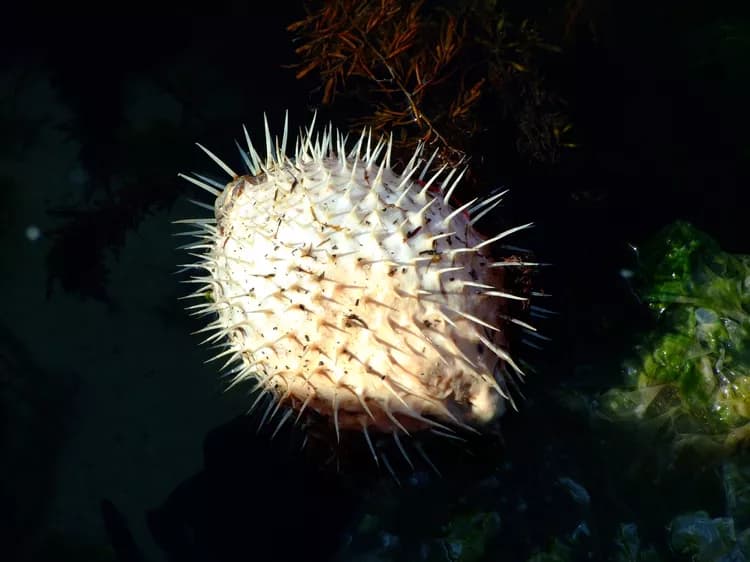What are the other Names for this Condition? (Also known as/Synonyms)
- Blowfish Poisoning
- Poisoning due to Pufferfish
What is Pufferfish Poisoning? (Definition/Background Information)
- The pufferfish is a fish found in the tropical and subtropical ocean waters. It is one of the most poisonous known animals, with venom (known as tetrodotoxin) toxicity over 1000 times greater than cyanide
- The fish gets its name from its ‘inflatability’ in the face of danger. It rapidly swallows seawater and balloons up (like a ball), to become much larger in size; hence, the name, pufferfish. It is also called the blowfish
- Pufferfish is a food delicacy in certain cultures, especially among the Japanese. If cut and cooked in the correct manner, pufferfish can be consumed. Pufferfish Poisoning occurs from eating incorrectly prepared and served pufferfish meat or dish
- Most cases of Poisoning due to Pufferfish consumption are serious and can result in death. The severity of the condition depends on the amount of toxin consumed
- Immediate medical attention has to be sought in all cases of Pufferfish Poisoning. The treatment is often symptomatic, because there is no available antidote for tetrodotoxin
- The prognosis is generally guarded and mostly depend upon the amount of toxin ingested and the speed with which treatment is provided
Who gets Pufferfish Poisoning? (Age and Sex Distribution)
- Any individual consuming pufferfish is at risk of Pufferfish Poisoning
- Both males and females are affected and there is no gender bias observed
- Pufferfish are sea-dwelling fishes found in tropical and subtropical belts of the world; some are known to inhabit freshwater rivers and lakes too
- However, only the Japanese are known to intentionally cook and consume pufferfish as a food delicacy
What are the Risk Factors for Pufferfish Poisoning? (Predisposing Factors)
The risk factors identified for Pufferfish Poisoning include:
- Consumption of improperly cut and prepared pufferfish
- Consuming pufferfish accidentally (like any other fish due to mistaken identity)
It is important to note that having a risk factor does not mean that one will get the condition. A risk factor increases ones chances of getting a condition compared to an individual without the risk factors. Some risk factors are more important than others.
Also, not having a risk factor does not mean that an individual will not get the condition. It is always important to discuss the effect of risk factors with your healthcare provider.
What are the Causes of Pufferfish Poisoning? (Etiology)
- Pufferfish Poisoning occurs on consumption of raw meat or prepared meat, or even pufferfish soup
- Depending on the portion consumed, the severity of the signs and symptoms is dictated
What are the Signs and Symptoms of Pufferfish Poisoning?
The signs and symptoms of Pufferfish Poisoning can onset within an hour (or less) of consuming its meat. These may include:
- Dizziness, intoxication
- Numbing of facial muscles and tongue
- Severe fatigue and weak muscles
- Vomiting
- Abnormal heart rate
- Decreased blood pressure
- Unconsciousness
The onset of signs and symptoms may occur within 5-10 minutes of fish consumption, or it may even take about 2 hours.
How is Pufferfish Poisoning Diagnosed?
A Pufferfish Poisoning is diagnosed through the following tools:
- A physical examination of the affected site by the physician is normally sufficient to diagnose a snake bite
- In addition, the symptoms exhibited by the individual may be carefully observed
- The individual may be asked to provide an account (history) of the events that occurred (what took place and how), if possible
- Blood tests consisting of complete blood count (CBC) and electrolytes
Many clinical conditions may have similar signs and symptoms. Your healthcare provider may perform additional tests to rule out other clinical conditions to arrive at a definitive diagnosis.
What are the possible Complications of Pufferfish Poisoning?
The complications that may arise from Pufferfish Poisoning include:
- Paralysis of muscles may occur after a few hours and can be fatal, if the respiratory system is affected
- Delirium and shock
- Coma and death
How is Pufferfish Poisoning Treated?
Emergency medical treatment measures for Pufferfish Poisoning may include:
- If the fish ingestion occurred within a few hours, then vomiting is induced
- CPR may be provided as necessary, including breathing assistance
- Monitoring of vital signs, stabilizing the blood pressure
- Use of activated charcoal to clean the gastrointestinal system (termed gastric lavage)
- Detoxification
- Proper follow-up care and check-ups may be required
Note: It is always important to call the local emergency helpline number (911 in the US) without any delay.
How can Pufferfish Poisoning be Prevented?
The following factors may be considered to reduce the incidence of Pufferfish Poisoning:
- Completely avoid the consumption of pufferfish
- Educating fishing community about avoiding the consumption of pufferfish, especially in the endemic regions
- Use excellently-qualified and well-trained cooks to cook pufferfish (if at all)
Note: Currently, there is no antidote available for Pufferfish Poisoning.
What is the Prognosis of Pufferfish Poisoning? (Outcomes/Resolutions)
- The prognosis of Pufferfish Poisoning is generally guarded
- If the individual’s condition stabilizes after 24 hours (whether in ICU or coma), then the prognosis may be slightly improved
Additional and Relevant Useful Information for Pufferfish Poisoning:
According to the National Geographic, a single pufferfish can contain enough venom to kill 30 adults.
Related Articles
Test Your Knowledge
Asked by users
Related Centers
Related Specialties
Related Physicians
Related Procedures
Related Resources
Join DoveHubs
and connect with fellow professionals


0 Comments
Please log in to post a comment.